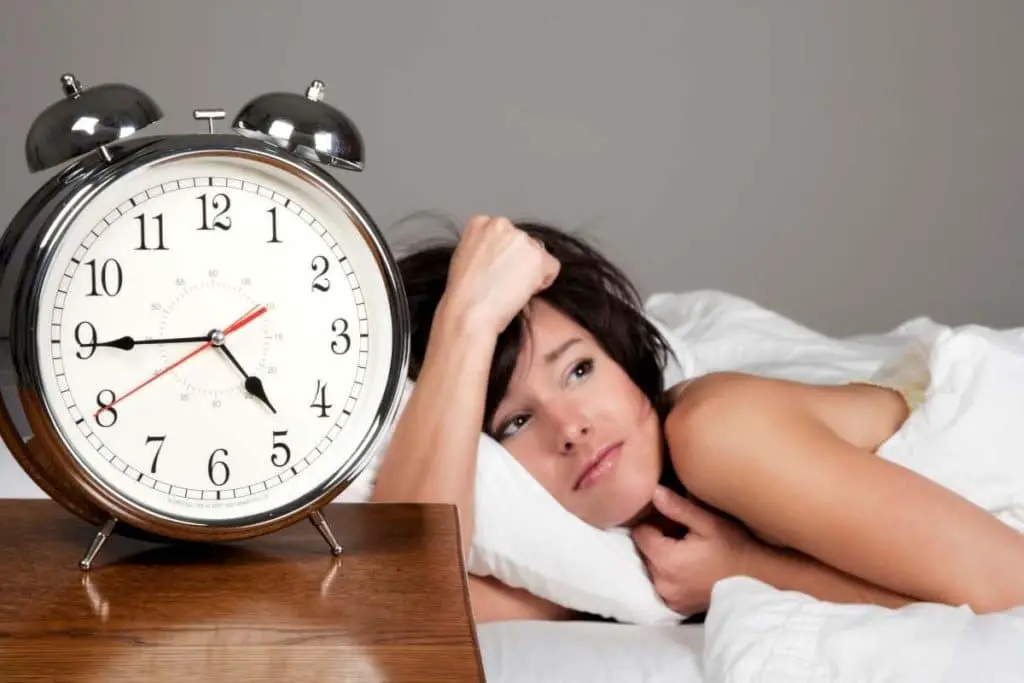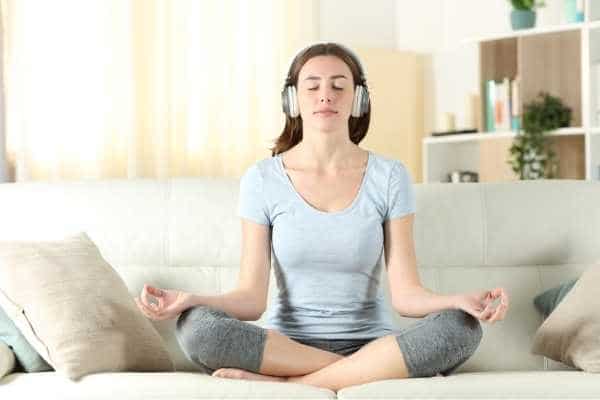Racing thoughts at night are often due to being in a fight or flight response. Here are some proven techniques to calm your body and mind.
Why Do I Have Racing Thoughts at Night?
Understanding the reason for your racing thoughts can ease stress and shame. And there may be specific treatments for the cause of your racing thoughts.

But the calming techniques discussed here are generally helpful for anyone whose mind is racing at night.
Racing Thoughts at Night Anxiety
Anxiety is a common cause of racing thoughts. Anxiety causes your mind and body to go into a fight or flight response.
Your brain is trying to figure it all out to keep you safe. This can be helpful when there is a critical situation…. but not so helpful when it an ongoing problem.
Racing Thoughts at Night ADHD
Racing thoughts are also common in ADHD. People with ADHD don’t necessarily have anxious thoughts. They can be thinking about…. well, anything really!
The ADHD brain is very curious and loves to problem solve. Even at night.

Another issue is that ADHD is linked to many sleep disorders, but especially ‘delayed sleep phase syndrome’, otherwise known as being an ADHD ‘Night Owl’.
Medication for Racing Thoughts at Night
If you are having very negative thoughts, please seek medical help immediately.
Racing thoughts can be common with PTSD, OCD, anxiety and ADHD, and specific medication may help.

Many people with ADHD have an improvement of their sleep disturbances when taking ADHD medications, even stimulants.
How to Get Rid of Racing Thoughts at Night
Be Kind to Yourself
First of all, have some compassion for yourself. It is really frustrating to be exhausted and not be able to sleep.

Expressive Writing
If you are constantly working problems out in your mind at night, it can be helpful to journal and try to work them out on paper before you try to sleep.
Expressive writing can be helpful to deal with traumatic events. You may want to do it in conjunction with therapy for something quite traumatic as it can be the start of unblocking a difficult issue.

If dealing with a difficult issue, there might be a short to short-term increase in distress, negative mood and physical symptoms.
But in studies people have found expressive writing significantly meaningful and emotional, and it can lead to long-term benefits, including the time it takes to fall asleep.
Use light exposure
Most people do not realize how powerful light exposure can be to treat insomnia. When we spent more time outside our bodies matched our circadian rhythm to nature.
Now that we spend more time inside we can get very messed up circadian rhythms.

It is very easy and surprisingly effective to spend some time outside in the morning every day within an hour of waking. We can also adjust our exposure to light by using bright light therapy in the morning and avoiding light exposure in the evening.
How to Calm Racing Thoughts at Night
Learn To Unfocus Your Mind With NSDR
One of the things necessary to fall asleep is to switch our bodies from an alert and focused state to a sleepy state. And this is something you can actually practice.

Techniques like non sleep deep rest, a term popularized by The Huberman Lab have been proven to help with insomnia. Yoga Nidra or self-hypnosis are two techniques for calming your brain.

Once you’ve practiced doing these, you’ll be able to use these skills at bedtime.
Meditation
Another way to learn to unfocus the mind is through meditation. And one particular type of meditation can be helpful for negative thoughts, a gratitude meditation.
This type of meditation helps you get out of a ruminating, worrying, fear based thought pattern and into a more hope based thought pattern. It has actually been shown that feeling gratitude can reduce activity in the amygdala, the fear center of our brains.

A lot of gratitude meditations focus on your being grateful for things in your life. However new research has shown that a meditation practice in which you focus on memories of people thanking you, and being grateful towards you is actually more powerful.
Breathwork
Breathing is also a serious underrated way to calm ourselves. If you are stressed out your breathing changes, and we can use certain breathing techniques to calm the body and mind.
Here are a few simple and effective calming breathing techniques:
- Physiologic sigh: double inhale through the nose followed by long exhale through the mouth
- Long exhale: exhale longer and/or more vigorously than inhale, slows down your heart rate
- 4-7-8 breathing: breathe in for a count of 4, hold for a count of 7, exhale for a count of 8
- Box breathing: inhale-hold-exhale-hold, all for equivalent duration, usually a count of 4

They may be simple but that doesn’t mean they are easy. I can do any of these if I am calm. But if I am very upset? Then the physiologic sigh may be all I can manage. But it works!
Taking supplements
Sometimes you want to take something to help with sleep, but you want something safe. Dr. Huberman, a professor at Stanford and the host of popular The Huberman Lab podcast has a ‘sleep cocktail’ he prefers.

He doesn’t like melatonin as an insomnia supplement feeling that light therapy is a much better way to adjust our own internal production of melatonin.

Good luck with falling asleep!
References
- Effects of chronotherapy on circadian rhythm and ADHD symptoms in adults with attention-deficit/hyperactivity disorder and delayed sleep phase syndrome: a randomized clinical trial
- Sleep in adults with attention deficit hyperactivity disorder (ADHD) before and during treatment with methylphenidate: a controlled polysomnographic study
- Emotional and physical health benefits of expressive writing
- Blocking nocturnal blue light for insomnia: A randomized controlled trial
- Effect of Light and Melatonin and other Melatonin Receptor Agonists on Human Circadian Physiology
- Yoga nidra practice shows improvement in sleep in patients with chronic insomnia: A randomized controlled trial
- The Tim Ferriss Show: Dr. Andrew Huberman — A Neurobiologist on Optimizing Sleep, Performance, and Testosterone (#521)
- Exploring neural mechanisms of the health benefits of gratitude in women: A randomized controlled trial
- Huberman Lab: MASTER YOUR SLEEP & BE MORE ALERT WHEN AWAKE
